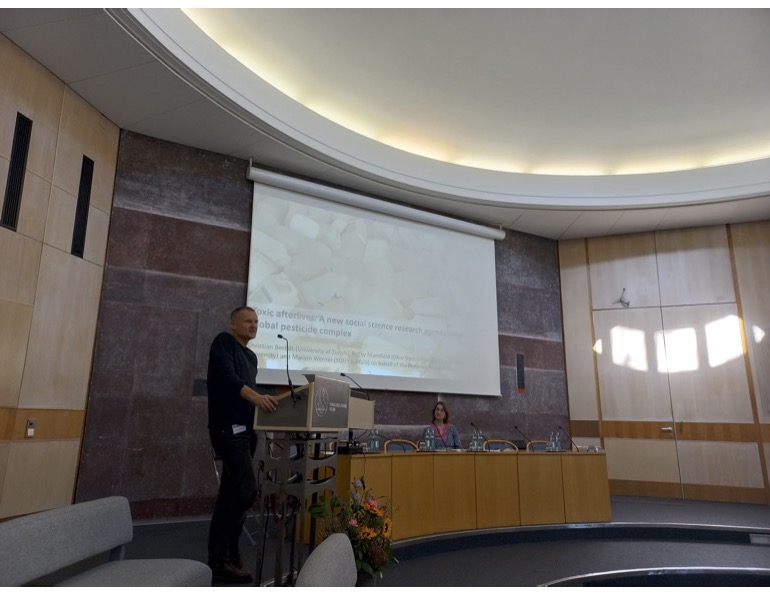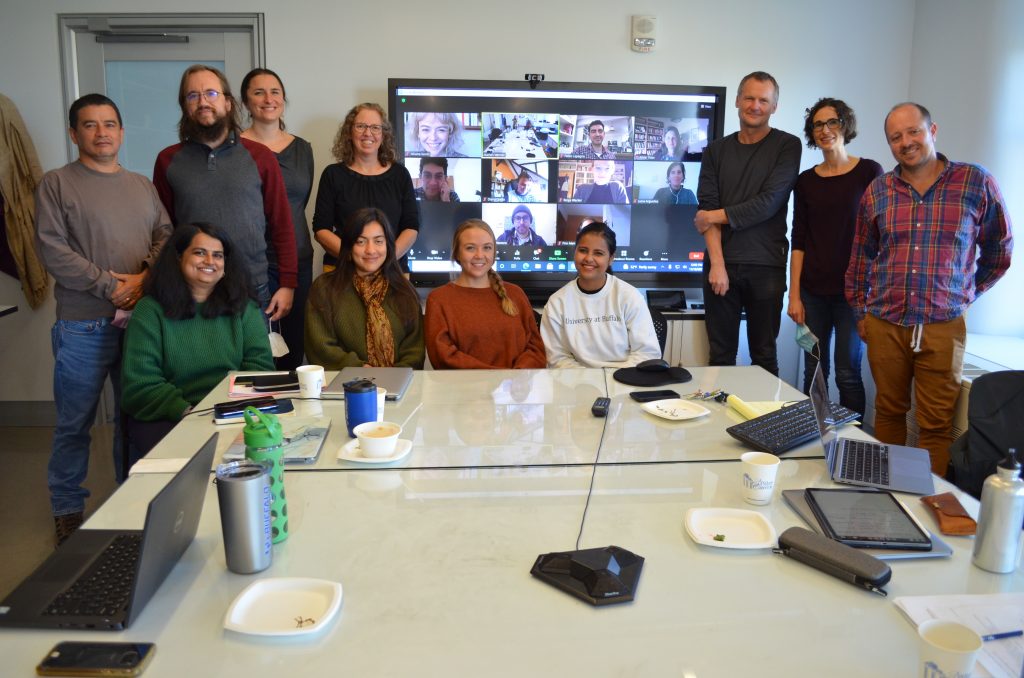PRN hosted a third workshop on May 15th, featuring a co-authored paper by Dr. Sarah Rogers (University of Melbourne) and PhD candidate Zhao Yue (University of Melbourne). The scholars shared their paper, Tracing China’s agrochemical complex, to a group of 22 scholars based in five countries. Anne Tittor (University of Jena) and Christian Berndt (University of Zurich) offered insightful commentaries. Many thanks to the authors for sharing their early work, to discussants for their commentaries, and to participants for additional insights and questions. We look forward to our next workshop in September 2023.
Category Archives: Uncategorized
Pesticide Research Network’s January workshop on Pesticides and Monocrops in Costa Rica
PRN hosted its third workshop on January 27th featuring a paper co-authored by ICTA-UAB PhD candidate Sole Castro and UB faculty member Marion Werner titled Pesticides and Food Regimes: A view from Costa Rica. The paper drew on Castro’s long-term fieldwork in Costa Rica to consider the legacies of decades of pesticide use — in soils, human bodies and social relations — for agrarian livelihoods. Fourteen scholars from five countries attended the workshop. Fernando Ramírez (IRET, Costa Rica) and Lucía Argüelles (Universitat Oberta de Catalunya) offered comments, followed by a lively discussion. We welcome participants to our next paper workshop in May 2023.
Pictured above, an ex-banana plantation worker shows the drainage and irrigation infrastructure used by the United Fruit Company over the course of the last century in the Pacific region of Costa Rica. UFCo divested from banana production on this plantation in the 1980s but this infrastructure, synthetic twine and copper sulfate pesticide persist in the soil and continue to condition livelihoods for the parceleros (farmers of small plots or parcelas) who now work this land. Photograph by Soledad Castro.
New Social Science Research Agenda for Pesticides Presented at “Silent Springs” Conference

On October 8th, Christian Berndt (University of Zurich) presented “Toxic afterlives: A new social science research agenda on the global pesticide complex” at the interdisciplinary “Silent Springs” workshop in Tutzing, Germany. The workshop was organized by the Rachel Carson Center for Environment and Society, a joint initiative of LMU-München and Deutsches Museum. The research agenda emerged from the inaugural “Global Glyphosate” workshop and written jointly by Becky Mansfield (Ohio State University), Annie Shattuck (Indiana University), Marion Werner (SUNY Buffalo), and Christian, with contributions from numerous workshop participants. The agenda will contribute to furthering the establishment of, and collaborations among, the Pesticide Research Network, which emerged from the workshop. Christian received excellent feedback from workshop participants, many of them environmental historians. Christian was joined by Soledad Castro (ICTA-UAB), who presented her co-authored paper on the chemicalization of agriculture in Costa Rica.
Second Successful Pesticide Research Network (PRN) Workshop
PRN hosted a second workshop on September 19th, this time featuring papers co-authored by faculty and PhD students. Twenty-one scholars based in six countries met virtually to discuss two papers. Andrés Caicedo (Environmental Studies UC-Berkeley) and Diana Ojeda (CIDER, Universidad de los Andes) shared a paper titled Pesticides, Plantations and Anti-Subversive tactics: Agro-military violence in Colombia. Brian Williams (Mississippi State University) and Johana Kunin (Escuela IDAES, Universidad Nacional de San Martín, Argentina) offered commentaries. Aniket Aga (Ashoka University) and Chitrangada Choudhury shared a draft of their paper, Killing Agroecology: The coming of the cotton-glyphosate complex in an Indian highland frontier. The paper received comments from Annie Shattuck (Indiana-Bloomington) and Abhigya (Indian Institute of Technology). Many thanks to our authors for sharing their early works, to reviewers for their astute commentaries, and to participants for additional insights and vibrant conversation. We look forward to our next workshop in January 2023.
Successful first Early Careers Workshop held by Pesticide Research Network
The Pesticide Research Network recently held its first successful Early Careers Workshop, designed to give graduate students and faculty support and feedback on scholarly works-in-progress. Our first participants sharing their work were Abhigya, a visiting fellow at Harvard Kennedy School, and student at the Indian Institute of Technology, New Delhi and Lorena Arias Solano from the Interdisciplinary Center for Development Studies (CIDER) at Universidad de los Andes. Abhigya circulated a working chapter of her dissertation entitled Beyond crops and corporations: Shaping crop protection practices in ‘basmati’ rice cultivation in the Western plains of Uttar Pradesh and received feedback from Aniket Aga (Ashoka University) and Annie Shattuck (Indiana University). Lorena depicted her research through a short video and shared a working proposal entitled Waterscapes, sugar production and politics of death in Colombia. She received feedback from Becky Mansfield (Ohio State University) and Marion Werner (University at Buffalo, SUNY).
The research network plans for an upcoming fall workshop in September.
New research group, Pesticide Research Network (PRN), to hold first Early Career Scholars workshop
A newly formed group of scholars and activists from eight different countries will hold their first early careers workshop on May 11th, 2022 from 10am-12pm (EST). Graduate students preparing to submit their dissertations will share their works-in-progress for critique, feedback and guidance. This year’s participants are Abhigya, Lorena Arias Solano, and María Soledad Castro Vargas. The workshop will take place virtually and will consist of short sessions dedicated to each scholar’s work, followed by feedback from two faculty members, and open discussion for comments and feedback from participants. If you are interested in attending, or would like more information on the Pesticide Research Network, please contact Dr. Marion Werner, wernerm@buffalo.edu.
Global Glyphosate Workshop held at University at Buffalo, SUNY

Scholars from eight countries gathered over two days in-person and virtually in November 2021 at the University at Buffalo to discuss new social science research challenges in the study of glyphosate and pesticide more broadly. The workshop allowed scholars from various backgrounds to consider the political, economic, environmental and public health implications of the pervasive use of agrochemicals. Researchers spent the initial day in breakout groups covering topics including the agrochemical industry restructuring, social science lenses on toxicity, and emerging geographies of regulation. On the second day, a larger group gathered to share themes, major points of discussion and raise questions. Ultimately, participants in the workshop plan to move forward with a research agenda based on the knowledge gained and shared over the two-day gathering.
This interdisciplinary workshop was the starting point for the Pesticide Research Network (PRN), a group of researchers using a critical social science lens to identify and address challenges posed by pesticides. If you would like to join PRN, please contact Caitlyn Sears (csears3@buffalo.edu).
For more information on the workshop, its participants and participant papers, see the University at Buffalo’s website.
Global dimensions of glyphosate debate
We recently published an article in The Conversation on the glyphosate debate. Our aim: to shift the debate towards considering how the political economy of glyphosate production is contributing to its environmental pervasiveness. You can read the short article here: While debate rages over glyphosate-based herbicides, farmers are spraying them all over the world.
New Policy Report
New policy report just released: “Growing agrichemical ubiquity: New questions for environments and health” by Annie Shattuck, Marion Werner, Christian Berndt, Becky Mansfield, and Ryan Galt, available here.
Summary:
In the last 20 years, agrichemical use has increased significantly around the world. Dramatic changes in the global pesticide industry are restructuring trade patterns, driving down costs, and making agrichemicals more affordable across the global South. The result is a global pesticide complex that touches more people than ever, while its impacts become decreasingly legible on public health and the environment. The herbicide glyphosate, made famous under the brand name Roundup and increasingly sold as a generic, is a major force in this change. Marketed as a benign substance despite substantial evidence of human health harms (IARC 2017), glyphosate has become a pervasive agrichemical used on record-setting amounts of land. Overall, changes in the pesticide industry, underpinned by skyrocketing demand for glyphosate and other pesticides, is ushering in a new era of agrichemical ubiquity. Understanding these recent changes is crucial to forming an updated global environmental health research and policy agenda.
New Publication
New article just published: “The glyphosate assemblage: Herbicides, uneven development, and chemical geographies of ubiquity” by Marion Werner, Christian Berndt, and Becky Mansfield, available here.
Abstract:
The ubiquity of chemicals demands new ways of thinking about human–nature assemblages. This article develops a dialogue between agrarian political economy, critical commodity chains research, and chemical geographies through a case study of the world’s most widely used agrochemical: glyphosate, commonly known as Monsanto’s Roundup. In the 1980s, glyphosate triumphed as a benign biocide that promised both safety and effectiveness. This construct made possible a capitalist agricultural assemblage characterized by chemical pervasiveness, first as a chemical replacement for mechanical tillage and since the 1990s as the chemical input for genetically modified seed packages. The ubiquity that characterizes the glyphosate assemblage is also a geography of uneven development comprising shifting firm networks, policies, and trade. Central to this assemblage since 2000, yet largely ignored, is the outsized expansion of second- and third-tier generic pesticide producers, especially in China, for whom glyphosate is part of a network entry and upgrading development strategy. Today, the glyphosate assemblage faces unprecedented challenges from weed resistance and health controversies. Whether and how the herbicide assemblage restabilizes will be determined by the complex environmental and developmental challenges of chemical agriculture and pervasive chemicals broadly, which highlights the need for a transdisciplinary dialogue that cuts across these domains.